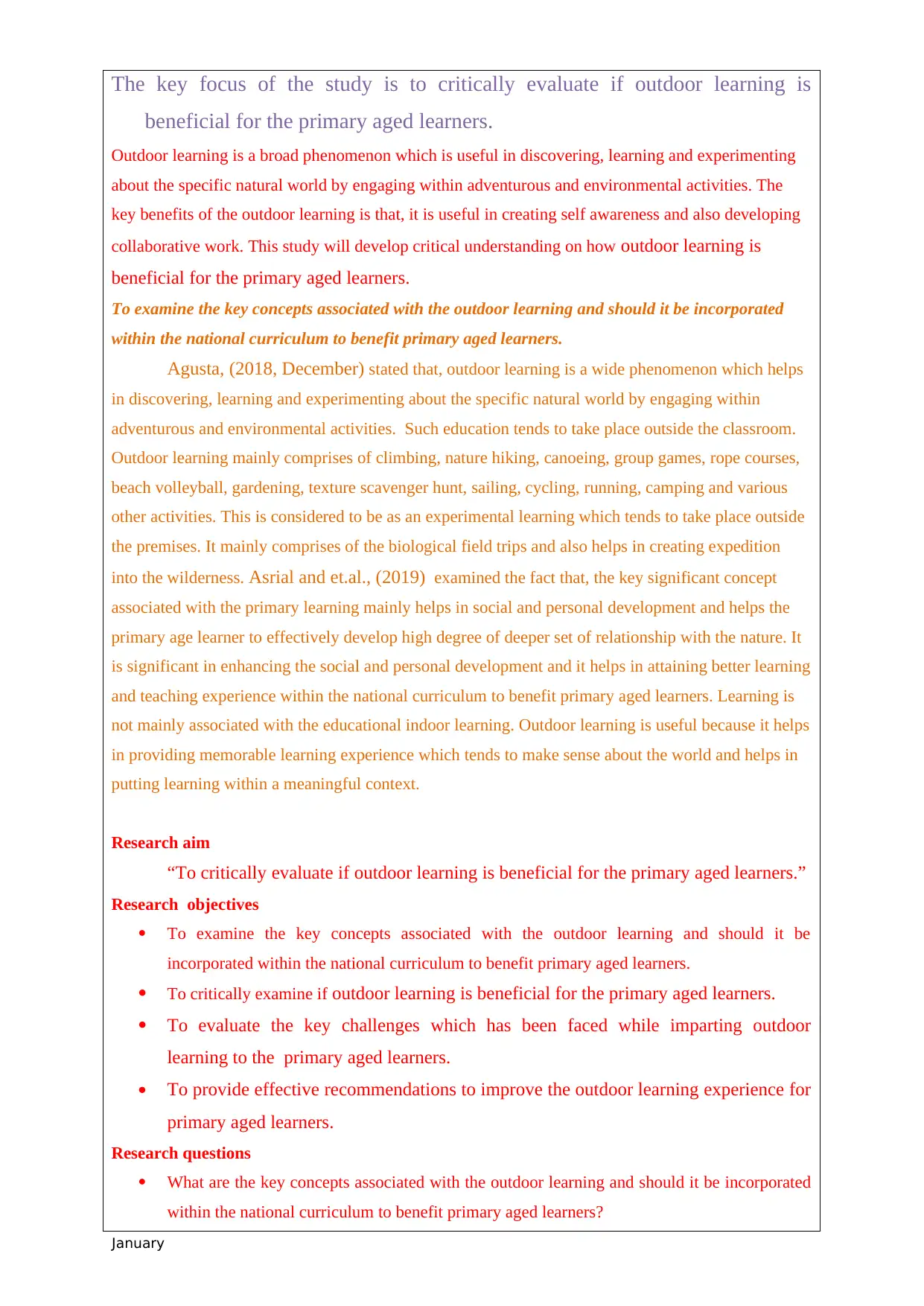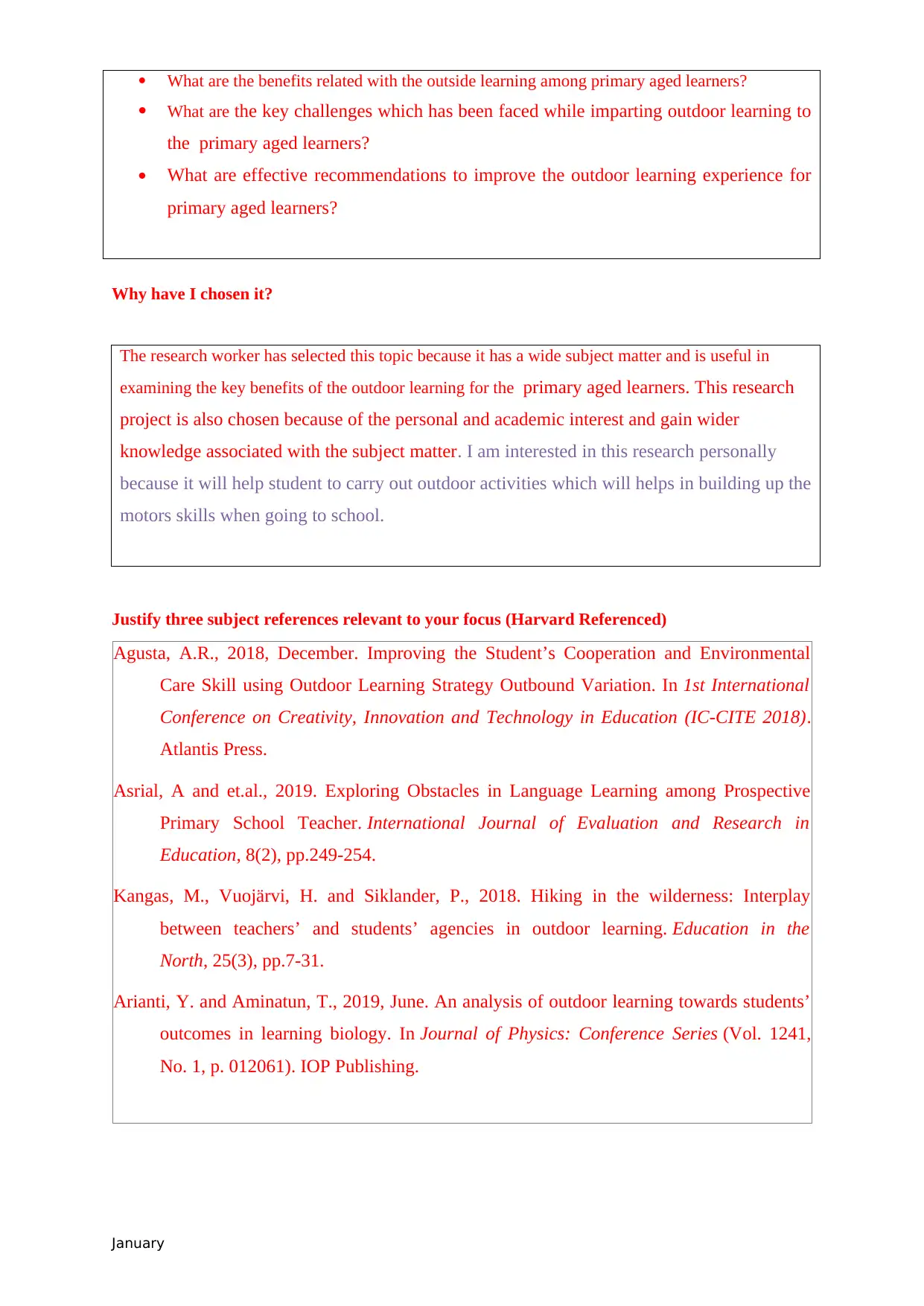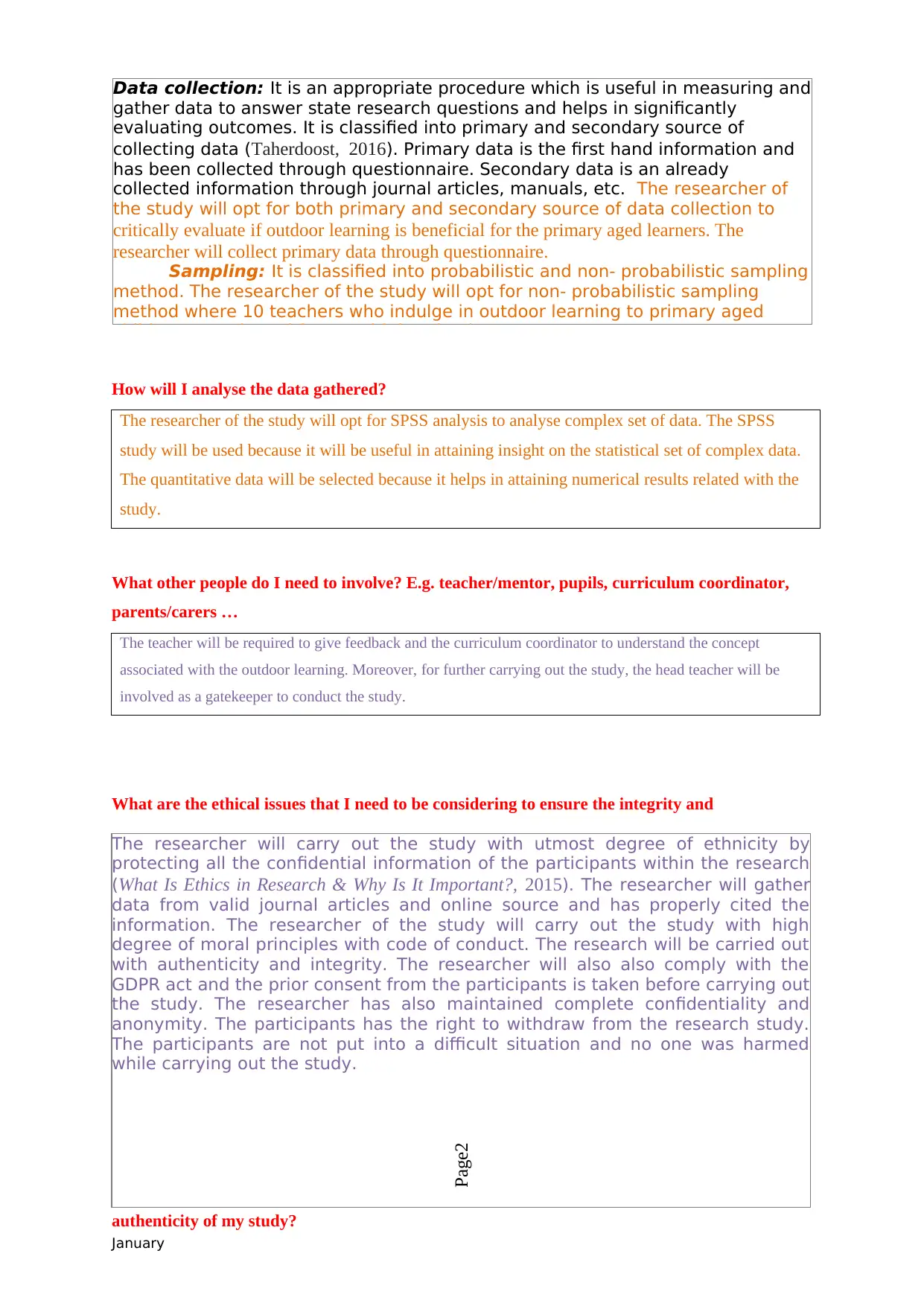Research Report: Outdoor Learning Benefits for Primary Aged Learners
VerifiedAdded on 2023/01/09
|7
|1481
|55
Report
AI Summary
This report focuses on critically evaluating the benefits of outdoor learning for primary aged learners. It explores the key concepts, advantages, and challenges associated with incorporating outdoor learning into the national curriculum. The research aims to determine if outdoor learning is beneficial, examining relevant research questions and objectives. The methodology includes data collection through questionnaires and the use of SPSS analysis. The report also addresses ethical considerations, sampling methods, and the involvement of teachers, curriculum coordinators, and the head teacher. Furthermore, it provides recommendations to improve the outdoor learning experience for primary aged learners. The study draws on various academic sources to support its findings, offering insights into the effectiveness of outdoor learning in enhancing children's educational outcomes.

January
2020
What is the focus of my study? How will it apply to my future employability?
Page1
2020
What is the focus of my study? How will it apply to my future employability?
Page1
Paraphrase This Document
Need a fresh take? Get an instant paraphrase of this document with our AI Paraphraser

January
2020
The key focus of the study is to critically evaluate if outdoor learning is
beneficial for the primary aged learners.
Outdoor learning is a broad phenomenon which is useful in discovering, learning and experimenting
about the specific natural world by engaging within adventurous and environmental activities. The
key benefits of the outdoor learning is that, it is useful in creating self awareness and also developing
collaborative work. This study will develop critical understanding on how outdoor learning is
beneficial for the primary aged learners.
To examine the key concepts associated with the outdoor learning and should it be incorporated
within the national curriculum to benefit primary aged learners.
Agusta, (2018, December) stated that, outdoor learning is a wide phenomenon which helps
in discovering, learning and experimenting about the specific natural world by engaging within
adventurous and environmental activities. Such education tends to take place outside the classroom.
Outdoor learning mainly comprises of climbing, nature hiking, canoeing, group games, rope courses,
beach volleyball, gardening, texture scavenger hunt, sailing, cycling, running, camping and various
other activities. This is considered to be as an experimental learning which tends to take place outside
the premises. It mainly comprises of the biological field trips and also helps in creating expedition
into the wilderness. Asrial and et.al., (2019) examined the fact that, the key significant concept
associated with the primary learning mainly helps in social and personal development and helps the
primary age learner to effectively develop high degree of deeper set of relationship with the nature. It
is significant in enhancing the social and personal development and it helps in attaining better learning
and teaching experience within the national curriculum to benefit primary aged learners. Learning is
not mainly associated with the educational indoor learning. Outdoor learning is useful because it helps
in providing memorable learning experience which tends to make sense about the world and helps in
putting learning within a meaningful context.
Research aim
“To critically evaluate if outdoor learning is beneficial for the primary aged learners.”
Research objectives
To examine the key concepts associated with the outdoor learning and should it be
incorporated within the national curriculum to benefit primary aged learners.
To critically examine if outdoor learning is beneficial for the primary aged learners.
To evaluate the key challenges which has been faced while imparting outdoor
learning to the primary aged learners.
To provide effective recommendations to improve the outdoor learning experience for
primary aged learners.
Research questions
What are the key concepts associated with the outdoor learning and should it be incorporated
within the national curriculum to benefit primary aged learners?
2020
The key focus of the study is to critically evaluate if outdoor learning is
beneficial for the primary aged learners.
Outdoor learning is a broad phenomenon which is useful in discovering, learning and experimenting
about the specific natural world by engaging within adventurous and environmental activities. The
key benefits of the outdoor learning is that, it is useful in creating self awareness and also developing
collaborative work. This study will develop critical understanding on how outdoor learning is
beneficial for the primary aged learners.
To examine the key concepts associated with the outdoor learning and should it be incorporated
within the national curriculum to benefit primary aged learners.
Agusta, (2018, December) stated that, outdoor learning is a wide phenomenon which helps
in discovering, learning and experimenting about the specific natural world by engaging within
adventurous and environmental activities. Such education tends to take place outside the classroom.
Outdoor learning mainly comprises of climbing, nature hiking, canoeing, group games, rope courses,
beach volleyball, gardening, texture scavenger hunt, sailing, cycling, running, camping and various
other activities. This is considered to be as an experimental learning which tends to take place outside
the premises. It mainly comprises of the biological field trips and also helps in creating expedition
into the wilderness. Asrial and et.al., (2019) examined the fact that, the key significant concept
associated with the primary learning mainly helps in social and personal development and helps the
primary age learner to effectively develop high degree of deeper set of relationship with the nature. It
is significant in enhancing the social and personal development and it helps in attaining better learning
and teaching experience within the national curriculum to benefit primary aged learners. Learning is
not mainly associated with the educational indoor learning. Outdoor learning is useful because it helps
in providing memorable learning experience which tends to make sense about the world and helps in
putting learning within a meaningful context.
Research aim
“To critically evaluate if outdoor learning is beneficial for the primary aged learners.”
Research objectives
To examine the key concepts associated with the outdoor learning and should it be
incorporated within the national curriculum to benefit primary aged learners.
To critically examine if outdoor learning is beneficial for the primary aged learners.
To evaluate the key challenges which has been faced while imparting outdoor
learning to the primary aged learners.
To provide effective recommendations to improve the outdoor learning experience for
primary aged learners.
Research questions
What are the key concepts associated with the outdoor learning and should it be incorporated
within the national curriculum to benefit primary aged learners?

January
2020
What are the benefits related with the outside learning among primary aged learners?
What are the key challenges which has been faced while imparting outdoor learning to
the primary aged learners?
What are effective recommendations to improve the outdoor learning experience for
primary aged learners?
Why have I chosen it?
The research worker has selected this topic because it has a wide subject matter and is useful in
examining the key benefits of the outdoor learning for the primary aged learners. This research
project is also chosen because of the personal and academic interest and gain wider
knowledge associated with the subject matter. I am interested in this research personally
because it will help student to carry out outdoor activities which will helps in building up the
motors skills when going to school.
Justify three subject references relevant to your focus (Harvard Referenced)
Agusta, A.R., 2018, December. Improving the Student’s Cooperation and Environmental
Care Skill using Outdoor Learning Strategy Outbound Variation. In 1st International
Conference on Creativity, Innovation and Technology in Education (IC-CITE 2018).
Atlantis Press.
Asrial, A and et.al., 2019. Exploring Obstacles in Language Learning among Prospective
Primary School Teacher. International Journal of Evaluation and Research in
Education, 8(2), pp.249-254.
Kangas, M., Vuojärvi, H. and Siklander, P., 2018. Hiking in the wilderness: Interplay
between teachers’ and students’ agencies in outdoor learning. Education in the
North, 25(3), pp.7-31.
Arianti, Y. and Aminatun, T., 2019, June. An analysis of outdoor learning towards students’
outcomes in learning biology. In Journal of Physics: Conference Series (Vol. 1241,
No. 1, p. 012061). IOP Publishing.
2020
What are the benefits related with the outside learning among primary aged learners?
What are the key challenges which has been faced while imparting outdoor learning to
the primary aged learners?
What are effective recommendations to improve the outdoor learning experience for
primary aged learners?
Why have I chosen it?
The research worker has selected this topic because it has a wide subject matter and is useful in
examining the key benefits of the outdoor learning for the primary aged learners. This research
project is also chosen because of the personal and academic interest and gain wider
knowledge associated with the subject matter. I am interested in this research personally
because it will help student to carry out outdoor activities which will helps in building up the
motors skills when going to school.
Justify three subject references relevant to your focus (Harvard Referenced)
Agusta, A.R., 2018, December. Improving the Student’s Cooperation and Environmental
Care Skill using Outdoor Learning Strategy Outbound Variation. In 1st International
Conference on Creativity, Innovation and Technology in Education (IC-CITE 2018).
Atlantis Press.
Asrial, A and et.al., 2019. Exploring Obstacles in Language Learning among Prospective
Primary School Teacher. International Journal of Evaluation and Research in
Education, 8(2), pp.249-254.
Kangas, M., Vuojärvi, H. and Siklander, P., 2018. Hiking in the wilderness: Interplay
between teachers’ and students’ agencies in outdoor learning. Education in the
North, 25(3), pp.7-31.
Arianti, Y. and Aminatun, T., 2019, June. An analysis of outdoor learning towards students’
outcomes in learning biology. In Journal of Physics: Conference Series (Vol. 1241,
No. 1, p. 012061). IOP Publishing.
⊘ This is a preview!⊘
Do you want full access?
Subscribe today to unlock all pages.

Trusted by 1+ million students worldwide

January
2020
These references are useful to gain wide set of insight related with the aim and objectives of
the study. These references will help the researcher to explore on evaluating if outdoor
learning is beneficial for the primary aged learners. Gaining insights from the multiple
scholar articles helps in understanding the for and against related within the specific theme of
the study. It helps in understanding various variables of the study.
2020
These references are useful to gain wide set of insight related with the aim and objectives of
the study. These references will help the researcher to explore on evaluating if outdoor
learning is beneficial for the primary aged learners. Gaining insights from the multiple
scholar articles helps in understanding the for and against related within the specific theme of
the study. It helps in understanding various variables of the study.
Paraphrase This Document
Need a fresh take? Get an instant paraphrase of this document with our AI Paraphraser

Page2
January
2020
How will I analyse the data gathered?
The researcher of the study will opt for SPSS analysis to analyse complex set of data. The SPSS
study will be used because it will be useful in attaining insight on the statistical set of complex data.
The quantitative data will be selected because it helps in attaining numerical results related with the
study.
What other people do I need to involve? E.g. teacher/mentor, pupils, curriculum coordinator,
parents/carers …
The teacher will be required to give feedback and the curriculum coordinator to understand the concept
associated with the outdoor learning. Moreover, for further carrying out the study, the head teacher will be
involved as a gatekeeper to conduct the study.
What are the ethical issues that I need to be considering to ensure the integrity and
authenticity of my study?
The researcher will carry out the study with utmost degree of ethnicity by
protecting all the confidential information of the participants within the research
(What Is Ethics in Research & Why Is It Important?, 2015). The researcher will gather
data from valid journal articles and online source and has properly cited the
information. The researcher of the study will carry out the study with high
degree of moral principles with code of conduct. The research will be carried out
with authenticity and integrity. The researcher will also also comply with the
GDPR act and the prior consent from the participants is taken before carrying out
the study. The researcher has also maintained complete confidentiality and
anonymity. The participants has the right to withdraw from the research study.
The participants are not put into a difficult situation and no one was harmed
while carrying out the study.
Data collection: It is an appropriate procedure which is useful in measuring and
gather data to answer state research questions and helps in significantly
evaluating outcomes. It is classified into primary and secondary source of
collecting data (Taherdoost, 2016). Primary data is the first hand information and
has been collected through questionnaire. Secondary data is an already
collected information through journal articles, manuals, etc. The researcher of
the study will opt for both primary and secondary source of data collection to
critically evaluate if outdoor learning is beneficial for the primary aged learners. The
researcher will collect primary data through questionnaire.
Sampling: It is classified into probabilistic and non- probabilistic sampling
method. The researcher of the study will opt for non- probabilistic sampling
method where 10 teachers who indulge in outdoor learning to primary aged
children are selected from multiple schools.
January
2020
How will I analyse the data gathered?
The researcher of the study will opt for SPSS analysis to analyse complex set of data. The SPSS
study will be used because it will be useful in attaining insight on the statistical set of complex data.
The quantitative data will be selected because it helps in attaining numerical results related with the
study.
What other people do I need to involve? E.g. teacher/mentor, pupils, curriculum coordinator,
parents/carers …
The teacher will be required to give feedback and the curriculum coordinator to understand the concept
associated with the outdoor learning. Moreover, for further carrying out the study, the head teacher will be
involved as a gatekeeper to conduct the study.
What are the ethical issues that I need to be considering to ensure the integrity and
authenticity of my study?
The researcher will carry out the study with utmost degree of ethnicity by
protecting all the confidential information of the participants within the research
(What Is Ethics in Research & Why Is It Important?, 2015). The researcher will gather
data from valid journal articles and online source and has properly cited the
information. The researcher of the study will carry out the study with high
degree of moral principles with code of conduct. The research will be carried out
with authenticity and integrity. The researcher will also also comply with the
GDPR act and the prior consent from the participants is taken before carrying out
the study. The researcher has also maintained complete confidentiality and
anonymity. The participants has the right to withdraw from the research study.
The participants are not put into a difficult situation and no one was harmed
while carrying out the study.
Data collection: It is an appropriate procedure which is useful in measuring and
gather data to answer state research questions and helps in significantly
evaluating outcomes. It is classified into primary and secondary source of
collecting data (Taherdoost, 2016). Primary data is the first hand information and
has been collected through questionnaire. Secondary data is an already
collected information through journal articles, manuals, etc. The researcher of
the study will opt for both primary and secondary source of data collection to
critically evaluate if outdoor learning is beneficial for the primary aged learners. The
researcher will collect primary data through questionnaire.
Sampling: It is classified into probabilistic and non- probabilistic sampling
method. The researcher of the study will opt for non- probabilistic sampling
method where 10 teachers who indulge in outdoor learning to primary aged
children are selected from multiple schools.

January
2020
What three research texts have I drawn from to formulate my proposal? (Harvard referenced)
Rahmat, R and et.al., 2019. The effectiveness of outdoor learning in improving spatial
intelligence. Journal for the Education of Gifted Young Scientists, 7(3), pp.717-730.
Mohajan, H.K., 2018. Qualitative research methodology in social sciences and related
subjects. Journal of Economic Development, Environment and People, 7(1), pp.23-48.
Kumar, R., 2019. Research methodology: A step-by-step guide for beginners. Sage
Publications Limited.
2020
What three research texts have I drawn from to formulate my proposal? (Harvard referenced)
Rahmat, R and et.al., 2019. The effectiveness of outdoor learning in improving spatial
intelligence. Journal for the Education of Gifted Young Scientists, 7(3), pp.717-730.
Mohajan, H.K., 2018. Qualitative research methodology in social sciences and related
subjects. Journal of Economic Development, Environment and People, 7(1), pp.23-48.
Kumar, R., 2019. Research methodology: A step-by-step guide for beginners. Sage
Publications Limited.
⊘ This is a preview!⊘
Do you want full access?
Subscribe today to unlock all pages.

Trusted by 1+ million students worldwide

January
2020
Page3
2020
Page3
1 out of 7
Related Documents
Your All-in-One AI-Powered Toolkit for Academic Success.
+13062052269
info@desklib.com
Available 24*7 on WhatsApp / Email
![[object Object]](/_next/static/media/star-bottom.7253800d.svg)
Unlock your academic potential
Copyright © 2020–2026 A2Z Services. All Rights Reserved. Developed and managed by ZUCOL.




